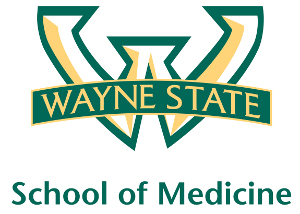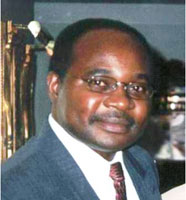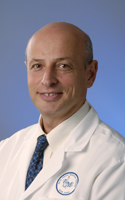The University of Texas Southwestern Medical Center is a public academic health science center in Dallas, Texas. With approximately 23,000 employees, more than 3,000 full-time faculty, and nearly 4 million outpatient visits per year, UT Southwestern is the largest medical school in the University of Texas System and the State of Texas.
Pediatric endocrinology is a medical subspecialty dealing with disorders of the endocrine glands, such as variations of physical growth and sexual development in childhood, diabetes and many more.

The Wayne State University School of Medicine (WSUSOM) is the medical school of Wayne State University, a public research university in Detroit, Michigan. It enrolls more than 1,500 students in undergraduate medical education, master's degree, Ph.D., and M.D.-Ph.D. WSUSOM traces its roots through four predecessor institutions since its founding in 1868.

Macon and Joan Brock Virginia Health Sciences at Old Dominion University, commonly known as Virginia Health Sciences and formerly Eastern Virginia Medical School (EVMS), is a public medical school in Norfolk, Virginia operated by Old Dominion University. Founded by grassroots efforts in the Southeastern part of Virginia known as Hampton Roads, EVMS has historically not been affiliated with an undergraduate institution and therefore coordinates training through multiple medical centers in the Hampton Roads region. Effective on July 1, 2024, the nearby Old Dominion University merged with EVMS to create a comprehensive university with EVMS being the medical school component of the larger university.
The Endocrine Society is a professional, international medical organization in the field of endocrinology and metabolism, founded in 1916 as The Association for the Study of Internal Secretions. The official name of the organization was changed to the Endocrine Society on January 1, 1952. It is a leading organization in the field and publishes four leading journals. It has more than 18,000 members from over 120 countries in medicine, molecular and cellular biology, biochemistry, physiology, genetics, immunology, education, industry, and allied health. The Society's mission is: "to advance excellence in endocrinology and promote its essential and integrative role in scientific discovery, medical practice, and human health."

The University of Wisconsin School of Medicine and Public Health (UWSMPH) is a professional school for the study of medicine and public health at the University of Wisconsin–Madison. It is one of only two medical schools in Wisconsin, along with the Medical College of Wisconsin in Milwaukee, and the only public one.
Feminizing hormone therapy, also known as transfeminine hormone therapy, is hormone therapy and sex reassignment therapy to change the secondary sex characteristics of transgender people from masculine or androgynous to feminine. It is a common type of transgender hormone therapy and is used to treat transgender women and non-binary transfeminine individuals. Some, in particular intersex people, but also some non-transgender people, take this form of therapy according to their personal needs and preferences.

Dr. Hossein Gharib is a physician who specializes in thyroid disorders. He was born in Tehran, Iran, on February 2, 1940, and is a consulting physician at the Mayo Clinic in Rochester, Minnesota.

Samuel E. Dagogo-Jack is a Nigerian-American physician. He is the A.C. Mullins Endowed Professor in Translational Research, Professor of Medicine, and Chief of the Division of Endocrinology, Diabetes, and Metabolism at the University of Tennessee Health Science Center.
Puberty blockers are medicines used to postpone puberty in children. The most commonly used puberty blockers are gonadotropin-releasing hormone (GnRH) agonists, which suppress the natural production of sex hormones, such as androgens and estrogens. Puberty blockers are used to delay puberty in children with precocious puberty. They are also used to delay the development of unwanted secondary sex characteristics in transgender children, so as to allow transgender youth more time to explore their gender identity. The same drugs are also used in fertility medicine and to treat some hormone-sensitive cancers in adults.
Gender-affirming hormone therapy (GAHT), also called hormone replacement therapy (HRT) or transgender hormone therapy, is a form of hormone therapy in which sex hormones and other hormonal medications are administered to transgender or gender nonconforming individuals for the purpose of more closely aligning their secondary sexual characteristics with their gender identity. This form of hormone therapy is given as one of two types, based on whether the goal of treatment is masculinization or feminization:

Leonid Poretsky is a Russian-born American endocrinologist. His research interests include mechanisms of insulin action in the ovary, endocrinological aspects of AIDS, and clinical outcomes in diabetes. He has authored over 150 publications and has served on the National Institutes of Health's review committees and on the editorial boards of the Journal of Clinical Endocrinology and Metabolism and other endocrine journals.
Shashank R. Joshi is an Indian endocrinologist, diabetologist and medical researcher, considered by many as one of the prominent practitioners of the trade in India. He was honoured by the Government of India, in 2014, by bestowing on him the Padma Shri, the fourth highest civilian award, for his services to the field of medicine. He is a part of the COVID-19 Task Force for the state of Maharashtra, India.
The American Association of Clinical Endocrinology (AACE)is a professional community of physicians specializing in endocrinology, diabetes, and metabolism. AACE's mission is elevating clinical endocrinology to improve global health. The association is headquartered in Jacksonville, Florida, US.
Ambrish Mithal is an Indian endocrinologist and diabetologist. He secured MBBS from GSVM Medical College, master's degree (DM) from the All India Institute of Medical Sciences, New Delhi. Then he worked at Sanjay Gandhi Post Graduate Institute of Medical Sciences, Lucknow and, later, at Apollo Hospitals, New Delhi before joining Medanta the Medicity as Chairman, Division of Endocrinology and Diabetes where he worked from 2009 to 2019. Subsequently, he joined Max Health Care where he is the chairman and head of Endocrinology and Diabetes department.

Seattle Cancer Care Alliance (SCCA) is a cancer treatment and research center in Seattle, Washington. Established in 1998, this nonprofit provides clinical oncology care for patients treated at its three partner organizations: Fred Hutchinson Cancer Research Center, Seattle Children's and UW Medicine. Together, these four institutions form the Fred Hutch/University of Washington Cancer Consortium.
Rexford Sefah Ahima is a professor of medicine, Public Health and Nursing; Bloomberg Distinguished Professor of Diabetes at the Johns Hopkins Medical School; and the Director of the Division of Endocrinology, Diabetes and Metabolism, Johns Hopkins University School of Medicine. Ahima's research focuses on central and peripheral actions of adipocyte hormones in energy homeostasis, and glucose and lipid metabolism.

Abbas Eqbal Kitabchi was an Iranian-born American doctor, teacher, and research scientist, whose major contributions in the field of medicine related to the treatment of severe conditions arising from diabetes. He spent his professional career in Memphis, TN and his work influenced the practices of physicians around the nation and the world.
Joyce Baird was a Scottish diabetes clinical and academic researcher, internationally cited for her work in both laboratory and clinical settings. Baird created the Metabolic Unit at the Western General Hospital, Edinburgh and established a model of patient care that allowed those with endocrine disorders to monitor and treat themselves without supervision, and was organised in 'family friendly' hours. Baird was Vice President of the European Association for the Study of Diabetes. A new 'Baird Family Hospital' is opening in Aberdeen, Scotland in 2021, named for Joyce Baird, her parents and her brother's contribution to UK medicine.

Benjamin Danielson is a pediatrician and clinical Professor of Pediatrics at the University of Washington School of Medicine. Throughout his time as a pediatrician, Danielson has facilitated the creation and development of diversity programs and contributed actively to governmental policy as a member of several health boards. Danielson was the medical director of the Odessa Brown Children's Clinic from 1999 to 2020, where he then resigned and spoke out about prevalent institutional racism and a resistance to change from hospital leaders. In September 2021, it was announced that Danielson would be directing a new program, Allies in Healthier Systems for Health & Abundance in Youth (AHSHAY) to help address and prevent youth incarceration.











